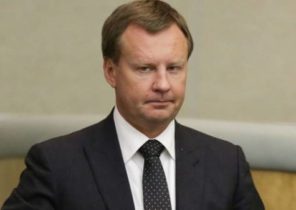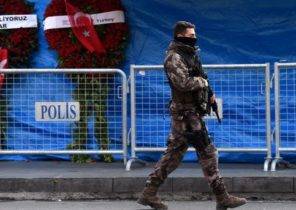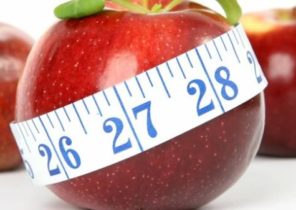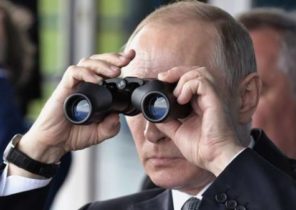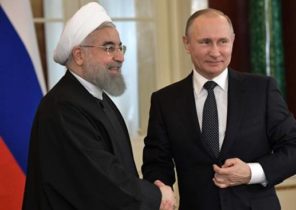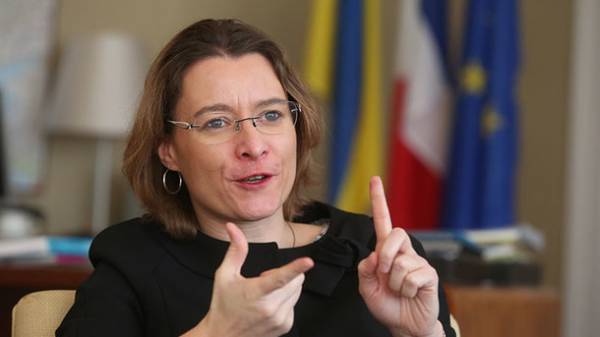
Almost three months Emmanuel macron at the helm of France and has already established himself as a harsh critic of the Putin regime and defender of Ukraine. During a meeting with Petro Poroshenko in Paris macron reminded Russia about the Ukrainian origin of the Queen of France Anne of Kiev, which Putin wrote in “the Russians”, and Yaroslav the Wise called the “Russian Prince”. But the behavior of the Russian President Makron is unlikely to affect. During the last telephone conversation on August 22, the leaders of the Normandy agreed about the next 11th truce in the Donbass in connection with the start of the new academic year. But it is not observed: losses in the ranks of the Ukrainian military there, but the militants regularly fire on our positions.
A few days ago in an interview, Emmanuel macron said about serious disagreements with Vladimir Putin on the Ukrainian issue, adding that it “will not allow Putin got away with it”. But at the same time urged not to stop the dialogue with Russia. Do not cease the rumors of the impending meeting of the Normandy four leaders. However, why to meet, even if the “road map” – a step-by-step plan of implementation of Minsk is not ready, an open question. Even before the summit to negotiate political advisers who agree on the contentious issues of the road map. Their date is still unknown. Why Minsk and the Channel processes are not stalled, as France supports Ukraine and why the main task of Ukraine – judicial reform – in an interview with “Today” said Ambassador extraordinary and Plenipotentiary of France in Ukraine Isabelle Dumont.
The support of France, its commitment to the sovereignty and territorial integrity of Ukraine are the constant reference point of our foreign policy on different levels
– A week ago, Ukraine celebrated the 26th anniversary of Independence. Change of attitude of France to Ukraine? What were the turning points?
– Our relationship is a relationship of friendship and partnership, strengthening the similarity between our countries and strong support by France to the Ukraine in all trials experienced by your country. France was on the side of Ukraine since its Declaration of independence. We welcomed the Orange revolution and born to her of hope, and then the Revolution of dignity, which confirms the desire of Ukrainians to radically change the country and to live in accordance with European values. But after the illegal annexation of Crimea by Russia and the conflict in Eastern Ukraine the relations between our countries have taken a special turn. The support of France, its commitment to the sovereignty and territorial integrity of Ukraine are the constant reference point of our foreign policy at different levels. In particular, in supporting the initiatives of Ukraine in the international arena and in the Channel format to achieve a peaceful settlement of the conflict. On a bilateral basis and within the framework of assistance provided by the European Union, France escort Ukraine in its aspiration to hold a series of reforms needed for the modernization and development of the country. In particular, we provide our experience, known in many fields, such as public administration, justice or renewable energy sources. For example, in the framework of the European programme “Support to Justice Sector Reforms in Ukraine”, the French Agency for International legal cooperation, together with its Polish, German and Lithuanian partners working to improve the efficiency of the judicial system. I think our relationships are even more important!
– When You first heard about the independent Ukraine? What would You change in the Ukrainians, or perhaps would take a lesson from us?
– I first visited Ukraine shortly after its Declaration of independence in the summer of 1992, and I remember a currency that went at the time – “coupons”. I went two years in a row, the first time it was an organized trip to the camp “Artek”: I won one month stay there in the linguistic Olympics; and after one or two years I drove part of the country by car and train. When Ukraine opened up to me in all its diversity; I was charmed by the beauty of the landscapes and the hospitality of the people. At that time I was very far from thinking that will come back to this beautiful country as Ambassador. What would I change in the Ukrainians? Hard to say, because the Ukrainians themselves are constantly changing. For several decades, they have adapted to a market economy and then to a democratic system… Changes in the economic, political and regional contexts was very fast and the Ukrainians were forced to show an impressive ability to adapt. And that’s what we would like to see immutable, and that cannot fail to inspire! Another feature deserving special attention is the love of freedom that drives the Ukrainians for many years, despite all the obstacles. However, we, like the entire Ukrainian people, looking forward to the new changes in Ukraine. For example, much remains to be done in the field of fight against corruption and reform of the judicial system. I think this is the key question that will allow your country to speed up its modernization and to improve its image among international investors.
– Has not been whether the official Paris the impression that Kiev can not determine its motion vector? After the Orange revolution, Ukraine seems to be gone in the EU and NATO. But Yanukovych came to power, turned 180 degrees in the direction of Russia.
– The history of France teaches us that the motion may undergo a pause, sometimes even simultaneously back. In addition to these shocks, Ukraine remarkably consistent, and there is a real continuity between the demands of activists of the Orange revolution and Maidan. The Ukrainian people have shown a strong commitment to European values, respect for human dignity, love of freedom. The values that defended the protesters, a pan – European. They unite us and strengthen our friendship.
– What, in Your opinion, the biggest challenge facing Ukraine? What are the main tasks You would highlight?
– From my side it would be wrong to teach something to a country that have suffered so much and passed so many tests. I can only say that we realize what kind of obstacles facing Ukraine, and we do everything possible to help her. A number of necessary reforms had been carried out very quickly, but much remains to be done. It is a long process that requires unwavering political will and a solid knowledge. The laws voted by the Parliament, must be respected, and it requires the will and determination power. We are well aware that some reforms are very unpopular, but Ukraine has a lot to win. Among the major challenges facing Ukraine today, I will call, first of all, the reform of the judicial system, which should facilitate the fight against corruption at all levels and to restore the confidence of the people. The Ukrainian people, the international community and investors expect that the courts will be independent and that the law is one for all. I believe that such reform is the key to success.
– Can we say that the friendship between France and Russia ended after the annexation of Crimea and the outbreak of the war in the Donbass? After all, we all remember the scandal with the Mistral.
– The position of France as the EU’s position, clear and unchanged: we remain committed to the restoration of the sovereignty of Ukraine within its internationally recognized borders and does not recognize the results of the “referendum” held in Crimea on March 16, 2014 and the annexation of this Ukrainian region to Russia. Meanwhile, to resolve the conflict is necessary to maintain political dialogue with Russia. We stand for the preservation of the different ways negotiations, including within the Normandy format, since it would be a mistake to believe that the conflict will resolve itself. During a meeting with Vladimir Putin in Versailles in may of this year the President of France Emmanuel macron gave a clear signal that the dialogue with Moscow would be “demanding” and “no concessions.”
– Why France has agreed to be part of the Normandy format? Whose it was idea to create a Channel format? You agree that the Normandy format at an impasse? What you need to do to move it?
– What are called “Norman format”, originated on the occasion of the celebration of the 70th anniversary of the allied landings in Normandy in June 2014. The President of the Republic Francois Hollande expressed a desire to meet the leaders of France, Germany, Ukraine and Russia to resolve the conflict in Ukraine. This meeting allowed the presidents of Russia and Ukraine to sit down at the negotiating table during the most intense tension. In the end, Russia and Ukraine signed the Minsk agreement, generated by the Channel format that prevented the escalation of violence. The conversation continues and now, but its content is not made public, which could give a sense of the hopelessness of the situation. However, on many issues, progress has been made in the exchange of prisoners and humanitarian aid. Along with Germany, France has demonstrated full commitment to discussion and committed to strengthen dialogue. But you should be aware that the future of the Minsk agreement depends primarily on the will of the parties to the conflict.
The role of the Macron in the Normandy format to become more decisive? How do You feel about the statements of some German politicians about what we need to forget about the Crimea, to restore the Donbass?
– France’s commitment to Ukraine’s sovereignty is real, and the fact that the President Makron took his Ukrainian counterpart at the Elysee Palace in less than two months after taking office, proving the priority of the Ukrainian question. France continues to support the Channel format and does everything possible to ensure that the discussions led to concrete results for peace and the civilian population. With regard to the Donbass and Crimea, our position has not changed, and the position of the European Union lies primarily in the protection of the territorial integrity and sovereignty of Ukraine.
– A “formula Rules“? What it will include? If we understand correctly, the “formula Rules” is the same as the “road map”, which was supposed to publish back in November of last year.
I think no need to talk about the “formula Rules” as a ready-to-use solution. The actions of the President of the Republic fully correspond to the Minsk agreements that are the basis for conflict resolution. The novelty of his approach lies rather in his determination to set clear and specific goals to achieve results. The President of the Republic, is a pragmatist, utilizing pragmatic approaches to achieve a peaceful and durable settlement of the conflict.
– When can a meeting between the leaders of the Normandy?
– Recently I had a conversation the heads of state of the Normandy format, which allowed for progress on many issues. Planned other meetings at various levels.
– You share the opinion of Jean-Claude Juncker that in the next 25 years, Ukraine will become an EU member?
– In General, the process of EU accession is a lengthy process. An example of the States of Central and Eastern Europe showed that a state wishing to join the EU, should, first, to meet certain political and economic criteria, and to demonstrate its ability to meet the obligations associated with membership. These criteria are called “Copenhagen criteria” represent an important step towards accession to the European Union. And only then begin negotiations on accession. It is also important to understand the possibilities to expand the European Union. We often forget that the EU must constantly strengthen and consolidate the achievements of 28 States, before continuing to expand. Therefore, it is a multifaceted process that involves many factors. In addition, I believe that the reforms conducted by Ukraine, are important to its own development. This investment in its future. His struggle for reform, judiciary, land, health reform, Ukraine needs to conduct for its own sake, and not just in the context of rapprochement with the European Union.
– How do you evaluate the unity of the EU on the anti-Russian sanctions? Why do we hear the dissatisfaction of some EU members because of the new anti-Russian sanctions imposed by the United States? Business is more important than principles?
– Decision regarding the renewal of sanctions was adopted by the European Union absolutely unanimously. The EU imposed against Russia three kinds of sanctions, some of them starting in 2014. This individual restrictive measures, renewed before September 15, 2017, the restriction of economic relations with the Crimea and Sevastopol extended until June 23, 2018, and economic sanctions in specific sectors, which extended until 31 January 2018. The resumption of sanctions is evidence of the unity of the EU on this issue. On the other hand, it is preferable to coordinate with all partners-members of the “Big seven” our sanctions policy, and in a broader sense, the tools that we have, diplomatic approaches, or trade measures. And American sanctions, you are talking about was taken without consideration of the interests of the various stakeholders. That is why Jean-Claude Juncker expressed his concern at the “unilateral effect and possible negative political consequences” that may be an American initiative.
– Under what conditions Russia will go to the Donbass and Crimea?
– Conditions known to all. They are connected in compliance with the basic principles of international law and the Minsk agreements.
